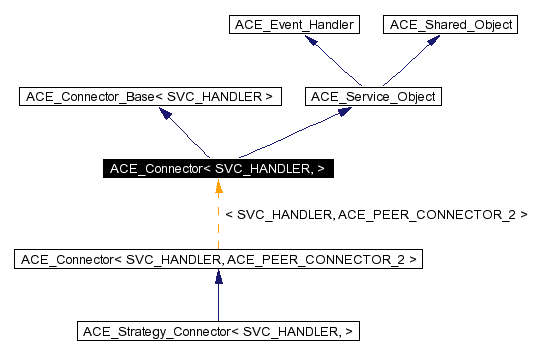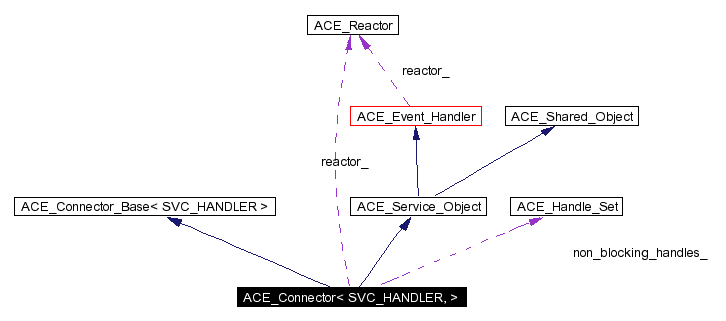
#include <Connector.h>
Inheritance diagram for ACE_Connector< SVC_HANDLER, >:


Public Types | |
| typedef ACE_TYPENAME SVC_HANDLER::addr_type | addr_type |
| typedef ACE_PEER_CONNECTOR | connector_type |
| typedef SVC_HANDLER | handler_type |
| typedef ACE_TYPENAME SVC_HANDLER::stream_type | stream_type |
| typedef ACE_TYPENAME _ACE_PEER_CONNECTOR::PEER_ADDR | ACE_TYPENAME_ACE_PEER_CONNECTOR_PEER_ADDR |
Public Methods | |
| ACE_Connector (ACE_Reactor *r=ACE_Reactor::instance(), int flags=0) | |
| virtual int | open (ACE_Reactor *r=ACE_Reactor::instance(), int flags=0) |
| virtual | ~ACE_Connector (void) |
| Shutdown a connector and release resources. | |
| virtual int | connect (SVC_HANDLER *&svc_handler, const ACE_PEER_CONNECTOR_ADDR &remote_addr, const ACE_Synch_Options &synch_options=ACE_Synch_Options::defaults, const ACE_PEER_CONNECTOR_ADDR &local_addr=(ACE_TYPENAME_ACE_PEER_CONNECTOR_PEER_ADDR &) ACE_PEER_CONNECTOR_ADDR_ANY, int reuse_addr=0, int flags=O_RDWR, int perms=0) |
| virtual int | connect (SVC_HANDLER *&svc_handler_hint, SVC_HANDLER *&svc_handler, const ACE_PEER_CONNECTOR_ADDR &remote_addr, const ACE_Synch_Options &synch_options=ACE_Synch_Options::defaults, const ACE_PEER_CONNECTOR_ADDR &local_addr=(ACE_TYPENAME_ACE_PEER_CONNECTOR_PEER_ADDR &) ACE_PEER_CONNECTOR_ADDR_ANY, int reuse_addr=0, int flags=O_RDWR, int perms=0) |
| virtual int | connect_n (size_t n, SVC_HANDLER *svc_handlers[], ACE_PEER_CONNECTOR_ADDR remote_addrs[], ACE_TCHAR *failed_svc_handlers=0, const ACE_Synch_Options &synch_options=ACE_Synch_Options::defaults) |
| virtual int | cancel (SVC_HANDLER *svc_handler) |
| virtual int | close (void) |
| virtual ACE_PEER_CONNECTOR & | connector (void) const |
| Return the underlying PEER_CONNECTOR object. | |
| virtual void | initialize_svc_handler (ACE_HANDLE handle, SVC_HANDLER *svc_handler) |
| Initialize Svc_Handler. | |
| virtual void | reactor (ACE_Reactor *reactor) |
| Set Reactor. | |
| virtual ACE_Reactor * | reactor (void) const |
| Get Reactor. | |
| void | dump (void) const |
| Dump the state of an object. | |
Public Attributes | |
| ACE_ALLOC_HOOK_DECLARE | |
| Declare the dynamic allocation hooks. | |
Protected Types | |
| typedef ACE_NonBlocking_Connect_Handler< SVC_HANDLER > | NBCH |
Protected Methods | |
| virtual int | make_svc_handler (SVC_HANDLER *&sh) |
| virtual int | connect_svc_handler (SVC_HANDLER *&svc_handler, const ACE_PEER_CONNECTOR_ADDR &remote_addr, ACE_Time_Value *timeout, const ACE_PEER_CONNECTOR_ADDR &local_addr, int reuse_addr, int flags, int perms) |
| virtual int | connect_svc_handler (SVC_HANDLER *&svc_handler, SVC_HANDLER *&sh_copy, const ACE_PEER_CONNECTOR_ADDR &remote_addr, ACE_Time_Value *timeout, const ACE_PEER_CONNECTOR_ADDR &local_addr, int reuse_addr, int flags, int perms) |
| virtual int | activate_svc_handler (SVC_HANDLER *svc_handler) |
| int | nonblocking_connect (SVC_HANDLER *, const ACE_Synch_Options &) |
| Creates and registers ACE_NonBlocking_Connect_Handler. | |
| virtual int | connect_i (SVC_HANDLER *&svc_handler, SVC_HANDLER **sh_copy, const ACE_PEER_CONNECTOR_ADDR &remote_addr, const ACE_Synch_Options &synch_options, const ACE_PEER_CONNECTOR_ADDR &local_addr, int reuse_addr, int flags, int perms) |
| Implementation the <connect> methods. | |
| ACE_Handle_Set & | non_blocking_handles (void) |
| virtual int | init (int argc, ACE_TCHAR *argv[]) |
| virtual int | fini (void) |
| Calls <handle_close> to shutdown the Connector gracefully. | |
| virtual int | info (ACE_TCHAR **, size_t) const |
| Default version returns address info in <buf>. | |
| virtual int | suspend (void) |
| virtual int | resume (void) |
Private Attributes | |
| ACE_PEER_CONNECTOR | connector_ |
| This is the peer connector factory. | |
| int | flags_ |
| ACE_Reactor * | reactor_ |
| Pointer to the Reactor. | |
| ACE_Handle_Set | non_blocking_handles_ |
| Handle set representing the non-blocking connects in progress. | |
Implements the strategy for actively establishing connections with clients. An ACE_Connector is parameterized by concrete types that conform to the interfaces of PEER_CONNECTOR and SVC_HANDLER. The PEER_CONNECTOR is instantiated with a transport mechanism that actively establishes connections. The SVC_HANDLER is instantiated with a concrete type that performs the application-specific service. Both blocking and non-blocking connects are supported. Further, non-blocking connects support timeouts.
|
|||||
|
|
|
|||||
|
|
|
|||||
|
|
|
|||||
|
|
|
|||||
|
|
|
|||||
|
|
|
||||||||||||||||
|
Initialize a connector. flags indicates how <SVC_HANDLER>'s should be initialized prior to being activated. Right now, the only flag that is processed is <ACE_NONBLOCK>, which enabled non-blocking I/O on the <SVC_HANDLER> when it is opened. |
|
||||||||||
|
Shutdown a connector and release resources.
|
|
||||||||||
|
Bridge method for activating a <svc_handler> with the appropriate concurrency strategy. The default behavior of this method is to activate the SVC_HANDLER by calling its <open> method (which allows the SVC_HANDLER to define its own concurrency strategy). However, subclasses can override this strategy to do more sophisticated concurrency activations (such as creating the SVC_HANDLER as an "active object" via multi-threading or multi-processing). Reimplemented in ACE_Strategy_Connector< SVC_HANDLER, >. |
|
||||||||||
|
Cancel a <svc_handler> that was started asynchronously. Note that this is the only case when the Connector does not actively close the <svc_handler>. It is left up to the caller of <cancel> to decide the fate of the <svc_handler>. |
|
||||||||||
|
Close down the Connector. All pending non-blocking connects are canceled and the corresponding svc_handler is closed. Reimplemented in ACE_Strategy_Connector< SVC_HANDLER, >. |
|
||||||||||||||||||||||||||||||||||||||||
|
This is a variation on the previous <connect> method. On cached connectors the <svc_handler_hint> variable can be used as a hint for future lookups. Since this variable is modified in the context of the internal cache its use is thread-safe. But the actual svc_handler for the current connection is returned in the second parameter <svc_handler>. If the connection fails the <close> hook on the <svc_handler> will be called automatically to prevent resource leaks. |
|
||||||||||||||||||||||||||||||||||||
|
Initiate connection of <svc_handler> to peer at <remote_addr> using <synch_options>. If the caller wants to designate the selected <local_addr> they can (and can also insist that the <local_addr> be reused by passing a value <reuse_addr> == 1). <flags> and <perms> can be used to pass any flags that are needed to perform specific operations such as opening a file within connect with certain permissions. If the connection fails the <close> hook on the <svc_handler> will be called automatically to prevent resource leaks. |
|
||||||||||||||||||||||||||||||||||||||||
|
Implementation the <connect> methods.
|
|
||||||||||||||||||||||||||||
|
Initiate connection of <n> <svc_handlers> to peers at <remote_addrs> using <synch_options>. Returns -1 if failure occurs and 0 otherwise. If <failed_svc_handlers> is non-NULL, a 1 is placed in the corresponding index of <failed_svc_handler> for each <svc_handlers[i]> that failed to connect, else a 0 is placed in that index. |
|
||||||||||||||||||||||||||||||||||||||||
|
Reimplemented in ACE_Strategy_Connector< SVC_HANDLER, >. |
|
||||||||||||||||||||||||||||||||||||
|
Bridge method for connecting the <svc_handler> to the <remote_addr>. The default behavior delegates to the <PEER_CONNECTOR::connect>. Reimplemented in ACE_Strategy_Connector< SVC_HANDLER, >. |
|
||||||||||
|
Return the underlying PEER_CONNECTOR object.
|
|
||||||||||
|
Dump the state of an object.
|
|
||||||||||
|
Calls <handle_close> to shutdown the Connector gracefully.
Reimplemented from ACE_Shared_Object. |
|
||||||||||||||||
|
Default version returns address info in <buf>.
Reimplemented from ACE_Shared_Object. |
|
||||||||||||||||
|
Default version does no work and returns -1. Must be overloaded by application developer to do anything meaningful. Reimplemented from ACE_Shared_Object. |
|
||||||||||||||||
|
Initialize Svc_Handler.
Implements ACE_Connector_Base< SVC_HANDLER >. |
|
||||||||||
|
Bridge method for creating a SVC_HANDLER. The default is to create a new SVC_HANDLER only if <sh> == 0, else <sh> is unchanged. However, subclasses can override this policy to perform SVC_HANDLER creation in any way that they like (such as creating subclass instances of SVC_HANDLER, using a singleton, dynamically linking the handler, etc.). Returns -1 if failure, else 0. Reimplemented in ACE_Strategy_Connector< SVC_HANDLER, >. |
|
||||||||||
|
Return the handle set representing the non-blocking connects in progress. Implements ACE_Connector_Base< SVC_HANDLER >. |
|
||||||||||||||||
|
Creates and registers ACE_NonBlocking_Connect_Handler.
|
|
||||||||||||||||
|
Initialize a connector. flags indicates how <SVC_HANDLER>'s should be initialized prior to being activated. Right now, the only flag that is processed is <ACE_NONBLOCK>, which enabled non-blocking I/O on the <SVC_HANDLER> when it is opened. Reimplemented in ACE_Strategy_Connector< SVC_HANDLER, >. |
|
||||||||||
|
Get Reactor.
Reimplemented from ACE_Event_Handler. |
|
||||||||||
|
Set Reactor.
Reimplemented from ACE_Event_Handler. |
|
||||||||||
|
Default version does no work and returns -1. Must be overloaded by application developer to do anything meaningful. Reimplemented from ACE_Service_Object. |
|
||||||||||
|
Default version does no work and returns -1. Must be overloaded by application developer to do anything meaningful. Reimplemented from ACE_Service_Object. |
|
|||||
|
Declare the dynamic allocation hooks.
|
|
|||||
|
This is the peer connector factory.
|
|
|||||
|
Flags that indicate how <SVC_HANDLER>'s should be initialized prior to being activated. Right now, the only flag that is processed is <ACE_NONBLOCK>, which enabled non-blocking I/O on the <SVC_HANDLER> when it is opened. |
|
|||||
|
Handle set representing the non-blocking connects in progress.
|
|
|||||
|
Pointer to the Reactor.
Reimplemented from ACE_Event_Handler. |
 1.2.18
1.2.18